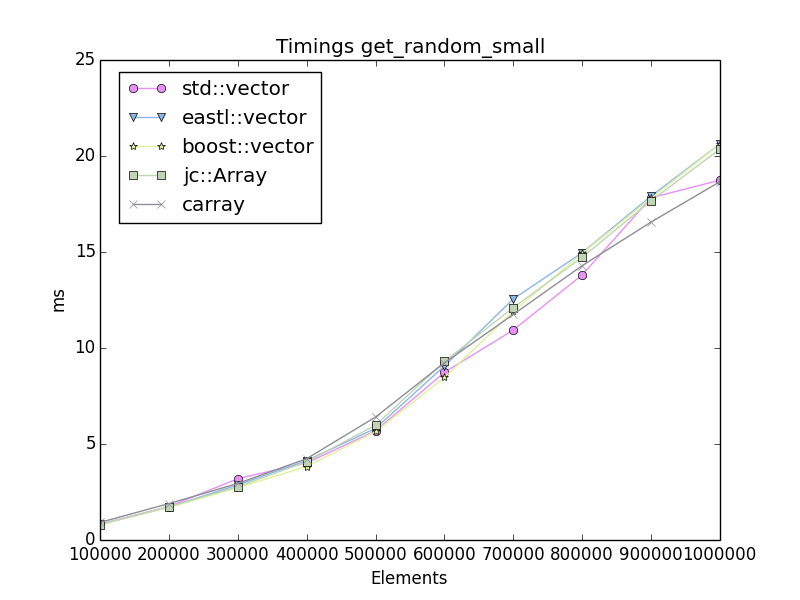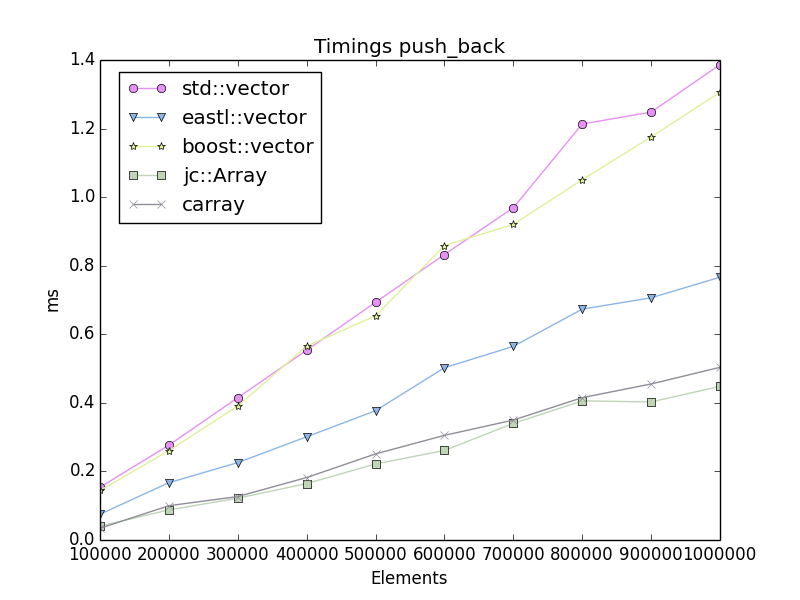| Build Status | macOS / Linux / Windows |
|---|---|
| master | |
| dev |
A collection of header only containers that I use
This software is supplied "AS IS" without any warranties and support
A fast and small C++ implementation of a hash table
- ~260 lines of code
- Open addressing
- Robin Hood collision resolving
- Backward shift deletion
- On par with Google's dense_hash_map
The jc::lower_bound and jc::upper_bound are about 1.6x - 2.3x faster than their STL counter parts.
The radix sort is a stable sort, which requires an output buffer of the same length. It is ~70 lines of code. It is 12%-25% faster than ska::sort
A fast and small C++ container for storing dynamic arrays.
- ~140 lines of code
- ~3x faster than std::vector, and ~2x faster than eastl::vector when using "push_back"
- Otherwise same performance as the others
- Header only C/C++ bit array
A small C++ ring buffer
- ~120 lines of code
- Can be resized (using realloc and copying items)
See benchmark page for more stats.
Performance examples for jc::HashTable.
==152.png)
==152.png)
Performance examples for jc::Array.(See benchmark page for more stats)


struct SPod
{
int i;
float f;
};
typedef jc::HashTable<uint32_t, SPod> hashtable_t;
uint32_t numelements = 1000; // The maximum number of entries to store
uint32_t load_factor = 85; // percent
uint32_t tablesize = uint32_t(numelements / (load_factor/100.0f));
uint32_t sizeneeded = hashtable_t::CalcSize(tablesize);
void* mem = malloc(sizeneeded);
hashtable_t ht;
ht.Create(numelements, mem);
SPod value = { 1, 2.0f };
ht.Put(17, value);
Spod* pval = ht.Get(17);
assert( pval->i == 1 );
assert( pval->f == 2.0f );
hashtable_t it = ht.Begin();
hashtable_t itend = ht.End();
for(; it != itend; ++it)
{
printf("key: %u value: %d, %f\n", *it.GetKey(), it.GetValue()->i, it.GetValue()->f);
}
ht.Erase(17);
free(mem);
#include <jc/array.h>
jc::Array<int> a;
a.SetCapacity(4);
for(size_t i = 0; i < a.Capacity(); ++i)
a.Push(i);
a.EraseSwap(0); // 0,1,2,3 -> 3,1,2
size_t sum = 0;
for(size_t i = 0; i < a.Size(); ++i)
sum += a[i];
#include <jc/ringbuffer.h>
jc::RingBuffer<int> a;
a.SetCapacity(4);
for(size_t i = 0; i < a.Capacity(); ++i)
a.Push(i);
// [0,1,2,3]
print("%d", a.Pop()); // -> 0
// [1,2,3]
a.Push(4);
// [1,2,3,4]
// Buffer is full.
// Either increase size...
if (a.Full())
a.SetCapacity(6);
// [1,2,3,4]
a.Push(5);
a.Push(6);
// [1,2,3,4,5,6]
// ... or, if full again, use the PushUnchecked()
a.PushUnchecked(7);
// [2,3,4,5,6,7]
// Loop over the items
for(int i = 0; i < a.Size(); ++i)
print("%d", a[i]);